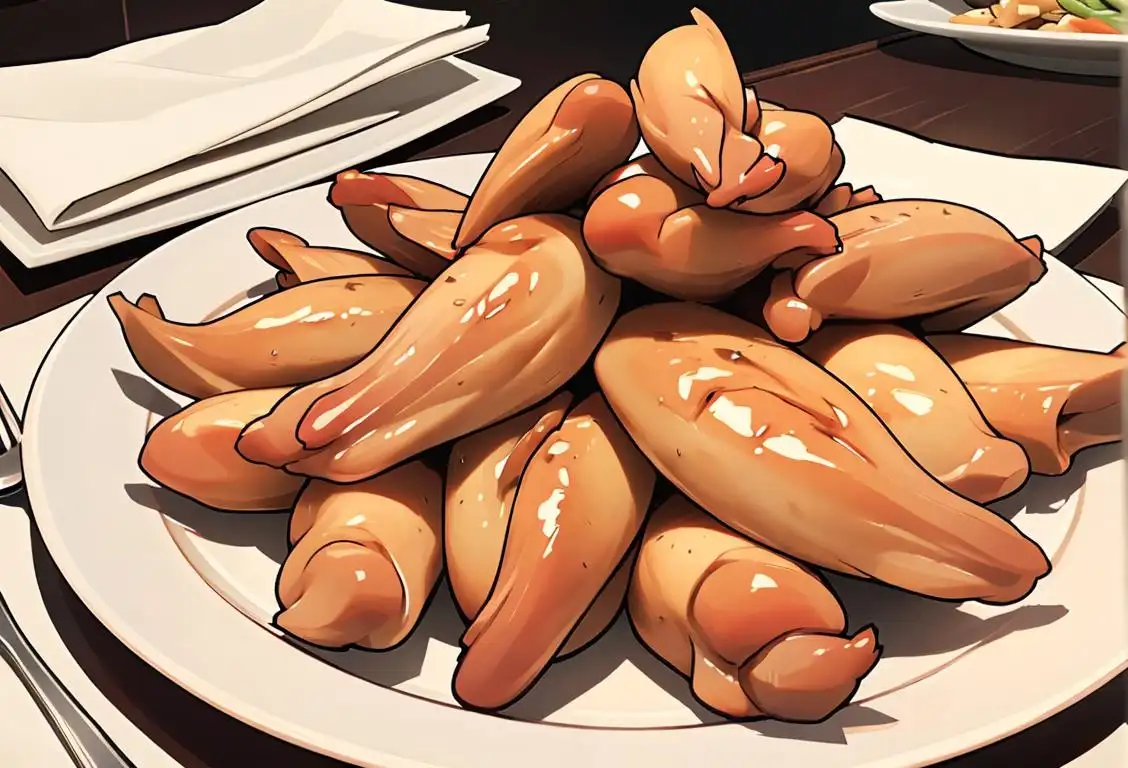National Jamaican Jerk Day

Hey there, jerk lovers! Get ready to spice up your day because we're talking about National Jamaican Jerk Day!
When is Jamaican Jerk Day?
It's national jamaican jerk day on the 25th October.
The Flavors of Jamaica
If you've never tried Jamaican jerk cuisine, you're seriously missing out. It's like a flavor explosion in your mouth – sweet, smoky, and spicy all at once! Jamaican jerk seasoning typically consists of a delicious blend of spices like allspice, thyme, garlic, scotch bonnet peppers, and more. When these flavors come together, it's like a Caribbean party in your taste buds.
A Bit of History
So, how did National Jamaican Jerk Day come to be? Well, it all started when a group of jerk aficionados decided that this incredible culinary tradition deserved its own special day of celebration. They wanted to spread the joy of jerk and honor the rich Jamaican heritage behind it. And thus, National Jamaican Jerk Day was born!
Spice Up Your Life
On this special day, people from all walks of life come together to enjoy the tantalizing flavors of Jamaican jerk. Whether you're grilling up some jerk chicken, pork, or even tofu, it's all about embracing the spicy goodness and celebrating the diversity of Jamaican cuisine. So, gather your loved ones, fire up the grill, and let the flavors of the Caribbean transport you to an island paradise, if only for a moment.
Did You Know?
In Jamaica, jerk isn't just about food. It's also a way of life! The term "jerk" actually refers to the style of cooking, which involves marinating meat in a special jerk sauce made from a blend of scotch bonnet peppers, pimento, and various spices. The meat is then slow-cooked over a pimento wood fire, which gives it that irresistible smoky flavor. It's a technique that has been passed down through generations, keeping the Jamaican jerk tradition alive and sizzling!
History behind the term 'Jamaican Jerk'
17th century
Introduction of African slaves to Jamaica
During the 17th century, African slaves were brought to Jamaica by the Europeans to work on the sugar plantations. With them, they brought their culinary traditions and cooking techniques, which laid the foundation for what would later become Jamaican cuisine.
1494
Christopher Columbus arrives in Jamaica
In 1494, Christopher Columbus and his crew arrived in Jamaica during his second voyage to the New World. This marked the beginning of European influence on the island, which would eventually shape Jamaican cuisine.
17th century
The Arrival of the Maroons
In the 17th century, Jamaica was home to a significant number of escaped African slaves known as Maroons. These freedom-seekers fled from Spanish and British plantations and formed communities in the mountainous regions of Jamaica. The Maroons, who were skilled hunters, used a technique of cooking their meat over open fires using a combination of herbs and spices to create a flavorful dish.
1655
British capture of Jamaica
In 1655, the British captured Jamaica from the Spanish, establishing their rule over the island. With the British colonization came the introduction of African slaves, who brought their cooking traditions and spices with them.
18th century
Creation of the Maroons
In the 18th century, enslaved Africans who escaped from the plantations formed self-sufficient communities known as Maroons. The Maroons developed their own unique cooking styles and flavors, fusing African, European, and indigenous influences. This marked the beginning of the Jamaican jerk tradition.
18th century
The Emergence of Jerk Seasoning
During the 18th century, the technique of cooking developed by the Maroons became known as 'jerking.' The term 'jerk' referred to both the cooking process and the spicy seasoning blend used to flavor the meat. The seasoning typically included scallions, thyme, garlic, pimento (allspice) berries, and Scotch bonnet peppers. Jerk seasoning was not only a way to add flavor but also served as a preservative due to the antimicrobial properties of some of the ingredients.
19th century
Jerk Cuisine Spreads
Throughout the 19th century, jerk cuisine gained popularity among the wider population of Jamaica. It transitioned from being exclusively prepared by the Maroons to becoming a beloved dish enjoyed by people from different cultural backgrounds. Jamaican jerk chicken and jerk pork became staples of the island's culinary scene.
18th century
Maroons in Jamaica
During the 18th century, escaped African slaves known as Maroons formed their communities in the mountainous regions of Jamaica. To preserve their freedom, they relied on hunting, farming, and developing unique cooking techniques, including jerk.
1838
Emancipation and further culinary development
After the abolition of slavery in 1838, many former slaves continued to work on the plantations as paid laborers. This allowed them to further develop their culinary skills and refine the Jamaican jerk cooking technique. They used a combination of aromatic spices, herbs, and local ingredients to create the distinctive flavors of jerk seasoning.
20th century
Commercialization and international popularity
In the 20th century, Jamaican cuisine gained international recognition, and jerk became one of its most iconic dishes. The distinct smoky and spicy flavors of jerk attracted the attention of tourists and food enthusiasts worldwide. Jamaican jerk seasoning and cooking techniques were commercialized, leading to the establishment of jerk restaurants and the widespread availability of jerk marinades and sauces.
20th century
Jamaican Jerk Goes Global
In the 20th century, with the increased globalization and migration, Jamaican jerk cuisine spread beyond the borders of Jamaica. As Caribbean communities formed in various parts of the world, such as the United Kingdom, Canada, and the United States, Jamaican jerk dishes became popular among both Caribbean expatriates and people from different cultural backgrounds. This led to the commercialization of jerk seasonings and the establishment of jerk restaurants worldwide.
19th century
Development of jerk seasoning
In the 19th century, jerk seasoning started to take shape as a distinct spice blend in Jamaica. The Maroons and other Jamaicans combined African, Indigenous, and European influences to create a robust and flavorful blend of spices.
Present
Jamaican Jerk's Continued Popularity
Today, Jamaican jerk has become synonymous with the bold and spicy flavors of Caribbean cuisine. The distinctive taste and cooking method have made jerk chicken, jerk pork, and other jerk dishes sought after by food enthusiasts globally. Jamaican jerk festivals and competitions celebrate the vibrant culture and culinary heritage associated with this flavorful cuisine.
1930s
Jerk becomes popular
In the 1930s, the popularity of jerk began to spread beyond Maroon communities and gained recognition among the wider population of Jamaica. It started as a street food, cooked by roadside vendors, and soon became a beloved Jamaican dish.
Present
Jamaican jerk as a global culinary phenomenon
Today, Jamaican jerk has become a global culinary phenomenon, with jerk-style dishes and seasonings being enjoyed in various parts of the world. The unique combination of spices like allspice, scotch bonnet peppers, thyme, and garlic creates a flavorful and fiery taste. Jamaican jerk festivals and events celebrate the rich cultural heritage of Jamaica and its contribution to the world of cuisine.
1980s
International recognition of Jamaican jerk
In the 1980s, Jamaican jerk cuisine gained international recognition. It became synonymous with the vibrant flavors and unique cooking techniques of Jamaican culture. Today, jerk chicken and other jerk dishes are celebrated worldwide.
Did you know?
Did you know that in Jamaica, jerk isn't just about food? It's a way of life!Tagged
awareness food funFirst identified
11th September 2020Most mentioned on
25th October 2020Total mentions
12Other days
Sweet Tea Day
Agriculture Day
Cheese Pizza Day
Bacon Day
Pumpkin Day
Medal Of Honor Day
Vodka Day
Foundation Day
Guac Day
Wing Day









